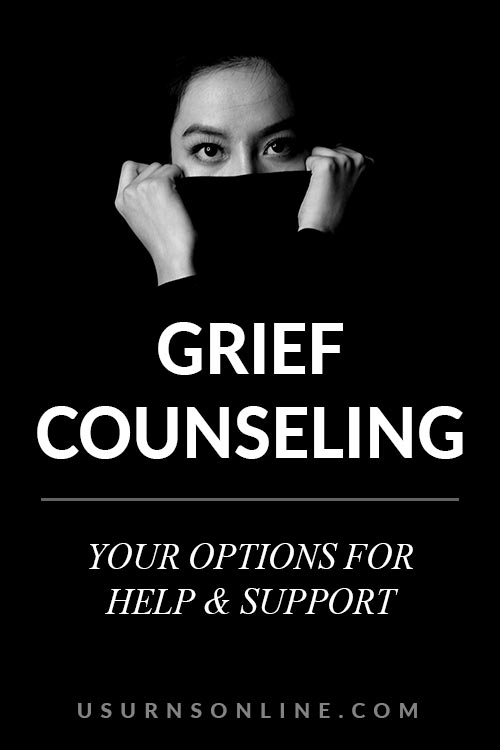We will all suffer grief, but we don’t need to go through it alone.
There are many options for finding help and support. Once you know the specific type of grief counseling you want or need, your web browser is a great starting point. You can type in your search bar, “grief counseling near me.”
The digital age is upon us; you don’t even have to leave your home to receive counseling. Counseling can now be done through Zoom or any video conferencing app.
But what, exactly, is grief counseling? How is counseling different from support groups? What do they talk about? And, most importantly, does it help?
Let’s learn some more.
What Is Grief Counseling?
Grief counseling is a specific form of therapy that helps you cope with the effects of a major loss. This typically involves discussing your feelings and reactions after the death of a loved one, a pet death, or any major loss that affects your life, including divorce, infertility, an adoption falling through, and other significant events.
Grief counseling is geared to help you deal with emotional, physical, social, and spiritual losses. The counselor will help you process what has happened, identify what you are experiencing, and provide strategies that help you cope in the healthiest way possible.
We all experience grief differently and with a wide range of emotions and physical symptoms. If you are speaking with a grief counselor, they will help and support you in this difficult time.
Related: Types of Grief – The 16 Ways People Grieve
Who Does Grief Counseling?
There are many professionals to choose from when it comes to counseling options. You can choose from a therapist, psychologist, or even a pastor. Read on to see a list of alternatives.
Urns Made in the USA
1. Professional Therapists
“Therapist” is a term referring to psychiatrists, psychologists, and counselors. These educated and certified individuals will provide professional services to a client for a set fee. A professional therapist has received training to help with mental, emotional, and even physical problems.
Psychiatrists are medical professionals who can diagnose mental health conditions and prescribe medicine.
Psychologists are trained in talk therapy, the study of behavior, and psychological testing and analysis.
Psychotherapists are trained in talk therapy to help with a wide range of mental health conditions.
Counselors are trained to help individuals address specific problems involving behavior and mental and emotional well being.
Each of these professionals can provide talk therapy, a.k.a. counseling. Therapists are trained to help you talk out your problems and find solutions. Therapists can help you understand yourself better. You will learn how to cope with life’s situations. Therapy will empower you!
Therapists do work in various places, including:
- Mental Health Clinic
- Community Center
- Hospital
- Online
- Military Facility
- Psychiatric Hospital
- Private Practice
- Schools
- Work Place
2. Licensed or Certified Grief Counselors
A licensed or certified grief counselor most often helps individuals and families deal with the death of a loved one. But, a grief counselor can help you work through any loss; the loss of a job, a divorce, the death of a dream, and even the loss of a beloved pet.
Grief comes in different forms for all people. Thankfully, there are numerous counselors to choose from.
A grief counselor will help guide you through the difficult stages of grief. Your counselor will help you move forward and learn how to grieve healthily.
Grief isn’t always a big life-shattering event; sometimes, it’s the small things we need help with. There is never a time to feel shame when reaching out for help. There are no problems that are too insignificant to discuss with a trained counselor.
3. Grief Support Groups
When you lose a loved one, you can feel alone, and you may need someone to talk to. If you don’t want “one on one” counseling, a grief support group could be right for you.
In a group setting, everyone participates. You work together and help each other. It can be break up the day from being alone. A person can experience instant validation from being around others who can understand on some level. You’re not crazy, nor are you the only one going through this.
You might find that by listening to other people as they cope with problems, you find a solution for yourself.
Most hospices would offer support groups, even if you didn’t use their services. Funeral homes and hospitals will also have grief support resources. Don’t hesitate to ask for help.
4. Pastoral Counseling
Pastoral counseling plays a vital role in grief recovery and will include your religious views. You will have your faith backed up with support and guidance to help you through your grief. God’s word will greatly help you deal with your grief and come to terms with death.
Your pastor will help you understand the promises of God and eternal life. You will be reunited with your loved one, eventually. This should bring you great comfort. Reminding yourself that your loved one is no longer suffering but whole and healthy!
Your church’s pastor is educated in Scripture and will be able to answer your questions on life and death.
Who Should Go to Grief Counseling?
It might be difficult to decide to seek counseling. It would be helpful to consider the list below and see how many you can relate to.
- Uncontrolled crying
- Change in sleeping patterns
- Suicidal thoughts
- Uncontrollable rage
- Difficulty engaging in daily life
- Significant weight loss
- Friends or family have pointed out that you should seek professional help
- Feeling like you’ve lost your identity
- You feel alone
- You’re scared
- None of the above, you would just like some help as you process this loss
Anyone who has undergone a loss will benefit from grief counseling. Many people go through the work of grieving without counseling. But counseling will almost always help you through the process.
There are other reasons why people seek grief counseling.
- The death of a pet
- Family trauma and abuse
- Divorce and separation
- Loss of a body part
- Getting fired from a job
- Loss of a home
If you feel like you can’t move on, that is the time to seek counseling.
Related: How Long Does Grief Last?
What Types of Grief Counseling Are There?
Grief counseling is also known as grief therapy. There are different types of grief counseling and different levels of grief to work through.
Group Counseling
In group counseling, there are always multiple clients and sometimes multiple counselors. The group can include anywhere from 5 people up to 15. You will have a built-in support network while attending this type of counseling. You will also learn from the other participants; what is working for them may work for you!
Individual Counseling
With individual counseling, you have the one-on-one experience. Everything is private. Often this approach can help you open up in ways that you might not in a group, or even with a close friend.
Your counselor will help you work through the loss you feel and help you acknowledge the loss, and learn how to accept it.
Proactive Therapy
Proactive therapy is a process that will encourage you to talk about your loved one. This can help you to keeping their memory alive while still moving forward.
In the past, perhaps grief was something you kept hidden away by pushing it down and trying to forget about it. With help, you can learn to take charge of your grief. In this way, you will find healthy ways to process it. That’s the focus of proactive therapy.
Family Counseling
This therapy is centered around helping families to work through difficult issues. This might mean guiding a family – young and old alike – in dealing with the loss of a parent, a child, a grandparent, or any close friend or relative.
Family counseling can be beneficial to any family during the time of loss.
What Do You Talk About in Grief Counseling?
Your therapist will inspire you to be open and honest about what you are working through. You must trust your therapist to know and understand you.
Talking points might include:
- How you handled loss in the past
- Discussing the loss of your loved one
- The type of relationship you had with your loved one
- Any unresolved issues between you and your loved one
- Dealing with guilt
- How to move forward
- Establishing new relationships
How to Choose a Grief Counselor
Finding yourself a good counselor can take work. Your counselor must be a good match for you. Don’t choose the first person that you see in your “Google search.” It would be best if you made phone calls to the counselor’s office.
Ask questions about the counselor:
- What type of experience does he/she have?
- What license or certificate does he/she hold?
- What techniques do they use?
- Do you feel like you can develop a good working relationship with the counselor?
Any counselor or therapist worth their salt will not be offended by your questions. They should be open about their education, credentials, and experience. If they are not, find someone else.
To find a “proper” counselor, they should have a degree. Training to be a counselor takes years of education.
A license will come through the state in which a therapist works. Licensure requirements vary from state to state. Requirements include submitting proof of education and training, passing the National Counselor Examination, or another state-recognized licensing exam. Once licensed, counselors must participate in a certain number of continuing education hours yearly.
A certificate, like a license, has certain requirements. The requirements vary from state to state. Holding a certificate can help a professional obtain a license. A certification is typically a voluntary process, not a requirement. A private organization often provides certification for individuals who have successfully met the requirements needed.
Most states require a counselor to have a license or a certificate.
Does Grief Counseling Work?
You will need to remember that it’s you that has to do the work. It is not the counselor’s job to take the pain away. The counselor or therapist is to be there to listen and encourage. They can provide advice, insight, guidance, and even assign homework. But ultimately, you will need to do the work of mourning.
It is possible to move forward! Grief therapy will not solve every problem due to your loss. But, it will help you move through the stages of grief. Therapy will be a powerful tool in your recovery.
You deserve to be happy!
Read Next: What is Prolonged Grief?
Pin It





